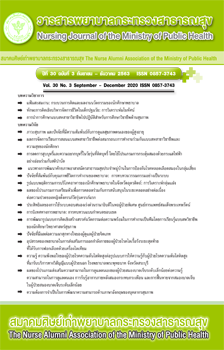Executive Function (EF) in Early Childhood: A Concept Analysis
Main Article Content
Abstract
Executive Function is an important concept that it is being discussed for promotion in preschool children. Executive Function is the role of function’s prefrontal lobe of the brain to coordinate with other parts of the brain for planning and administration of routine daily life. From literature review, the meanings and interpretations of the term Executive Function are varied and vague. This concept analysis was intended to clarify the meaning, critical attributes, and its components. A conceptual analysis based on the framework of Walker and Avant combined with an integrative review were used and presented along with samples and guidelines for concept application. The concept can be summarized as 2 attributes, as follows 1) high level and complex functions of the prefrontal lobe of the brain, and 2) connection between parts of the brain for emotional and behavior control, including 2.1) manage, initiate, and practice, 2.2) planning, monitoring, and evaluating, 2.3) inhibitory control, shift or cognitive flexibility, working memory, and 2.4) attention and goal-directed persistence. The concept was composed of clusters of skills with a total of nine aspects. The meanings of Executive Function and developmental stage are needed to be concerned for effective promotion of the Executive Function skills.
Article Details
บทความและรายงานวิจัยในวารสารพยาบาลกระทรวงสาธารณสุข เป็นความคิดเห็นของ ผู้เขียน มิใช่ของคณะผู้จัดทำ และมิใช่ความรับผิดชอบของสมาคมศิษย์เก่าพยาบาลกระทรวงสาธารณสุข ซึ่งสามารถนำไปอ้างอิงได้
References
2. Chutabhakdikul N, Thanasetkorn P, Lertawasdatrakul O, Ruksee N. Tools development and normative criteria for assessment of executive function in early childhood. Bangkok: Institute of Molecular Biosciences, Mahidol University;2017:146-50. ( in Thai)
3. Chano J. Executive functions and early childhood development. Journal of Education Mahasarakham University 2019;13(1):7-17. (in Thai)
4. Tantitara T. Effects of using a positive discipline program on executive function in young children [Thesis]. Bangkok: Chulalongkorn University;2016. (in Thai)
5. Krongthong S. Strategies to develop the internal quality assurance system of the child development center focusing on the concept of executive functions [Dissertation]. Bangkok: Chulalongkorn University;2016. (in Thai)
6. Walker L, Avant K. Strategies for theory construction in nursing. 6th ed. Norwalk: Appleton & Lange; 2019.
7. Rangsiyanon K. Teacher and parent’s guide to development of executive function in preschooler. Bangkok: Purlungi; 2020. (in Thai)
8. Chano J. Executive functions and early childhood development. Journal of Education Mahasarakham University 2019;13(1):7-17. (in Thai)
9. Promsukkul P. Music and executive function. Veridian E-journal, Silpakorn University 2019;11(2): 1175-92. (in Thai)
10. Tantitara T. Effects of using a positive discipline program on executive function in young children [Thesis]. Bangkok: Chulalongkorn University;2016. ( in Thai )
11. Ooppakarn DA. Development of instructional process in free play activities base on tools of the mind and brain base learning approaches to enhance executive functions of kindergarteners [Dissertation]. Bangkok: Chulalongkorn University;2017. (in Thai)
12. Ruksee N. The development of a program for promoting brain skills for executive cognition through sensory integration activities in preschool children. Bangkok: Mahidol University;2018. (in Thai)
13. Thanasetkorn P, ChumchuaV, Chutabhakdikul N. The preliminary research study on the impact of the 101s: a guide to positive discipline parent training on parenting practices and preschooler’s executive function. APJRECE 2015;9(1):19-43.
14. Nakhonchai S, Jongrachen P. Development of the executive functions performance assessment instruments in preschoolers. In Graduate School, The National and International Graduate Research Conference 2017; March 10, 2017; Pote Sarasin building KhonKaen University: Graduate School Khon Kaen University; 2019. p1889-90. (in Thai)
15. Ooppakarn D, Yanachai O. What principle should we use to enhance learning development of early childhood children: “brain based learning” or “executive functions” Veridian E-Journal, Silpakorn University 2019; 11(1):1635-51. (in Thai)
16. Srinakharinwirot University. Curriculum for early childhood teacher competency development in skill development think for a successful life: EF that is compliant with the early childhood education standards. Bangkok: Srinakharinwirot University;2017. (in Thai)
17. Tamaekong A. The impacts of the I am tap program of the preschool children’s executive function skills. Journal of education faculty of education Srinakharinwirot University 2019;14(1):182-96. (in Thai)
18. Muangthong W, Kaewurai W, Onthanee A, Juntakun J. Using executive function to enhance reasoning thinking of preschool children: What teachers should not overlook. Ratchaphruek Journal 2019;18(1):20-8. (in Thai)
19. Krongthong S. Strategies to develop the internal quality assurance system of the child development center focusing on the concept of executive functions [Dissertation]. Bangkok: Chulalongkorn University 2016;15-6. (in Thai)
20. Escolano-Pérez E, Herrero-Nivela ML, Blanco-Villaseor A, Anguera MT. Systematic observation: relevance of this approach in preschool executive function assessment and association with later academic skills. Front. Psychol 2017;8:2031.
21. Williams GW, Shankar B, Klier EM, Chuang AZ, Marjiya-Villarreal SE, Nwokolo OO, Sharma A, et.al. Sensorimotor and executive function slowing in anesthesiology residents after overnight shifts. J Clin Anesth 2017;40:110-6.
22. Ferrier DE, Bassett HH, Denham, S. Relations between executive function and emotionality in preschoolers: exploring a transitive cognition-emotion linkage. Front Psychol 2014;5:487.
23. Lerner MD, Lonigan, CJ. Executive function among preschool children: unitary versus distinct abilities. J Psychopathol Behav Assess 2014; 36 (4):626-39.
24. Lonigan CJ, Lerner MD, Goodrich JM, Farrington AL, Allan DM. Executive function of Spanish-speaking language-minority preschoolers: structure and relations with early literacy skills and behavioral outcomes. J Exp Child Psychol 2016;144:46–65.
25. Hughes SO, Power TG, O’Connor TM, Orlet Fisher J. Executive functioning, emotion regulation eating self-regulation, and weight status in low-income preschool children: how do they relate? Appetite 2015;89:1-9.
26. Thanasetkorn P. Executive function and early childhood development in EF executive functions development manual for early childhood’s teacher. Bangkok: Mathichon; 2018. (in Thai)
27. Harnmathee S. Executive functions development manual for early childhood’s teacher. Bangkok: Mathichon; 2018. (in Thai)
28. Sherman EMS, Brooks BL. Behavior Rating Inventory of Executive Function-Preschool version (BRIEF-P):
test review and clinical guidelines for use. Child Neuropsychology 2010; 16 (5):503-19.
29. Achenbach T M. The child behavior checklist and related instruments. In: Maruish M E, editors. The use of psychological testing for treatment planning and outcomes assessment. Lawrence Erlbaum Associates;1999. p. 429–66.
30. Kopp B, Maldonado N, Scheffels JF, Hendel M, Lange F. A meta-analysis of relationships between measures of Wisconsin Card Sorting and intelligence. Brain Sci. 2019; 9 (12):349.

